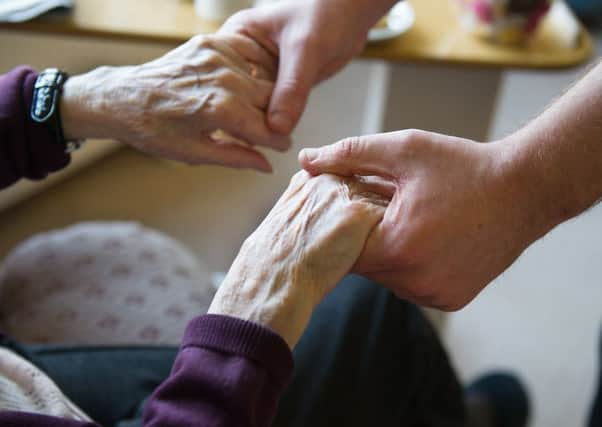Helen Martin: The crisis of how to care for our elderly


Now, those who need such care are being asked to look after themselves or have their families step in to fill the care gap. We just don’t have the care staff and resources to cope with our ageing population’s needs.
Years ago, the elderly were routinely cared for by their own family. The world has changed. The harsh truth is that without the medical advances of today, old people died younger. Conditions now curable or treatable, ended their days. Care was simpler, less complex, especially as a much higher percentage passed on before dementia kicked in.
Advertisement
Hide AdAdvertisement
Hide AdBack in the day, one member of a middle-aged couple (usually the husband/father) was the bread-winner, leaving the other (usually the wife/mother) to take on all the caring.
Today, particularly in a city like Edinburgh, both have to work full-time to pay the rent, mortgage, bills and support their own children up to and beyond college, uni or apprenticeships.
Some elderly – without serious physical disabilities or frailty, and who are still mentally alert – can happily and proudly live in their own homes, enjoying life to the full.
The drive to keep the genuinely vulnerable elderly living “independently”, with council care visits, for as long as possible was down to the massive cost of residential care to councils and the government, as much (or more) than it was about being “nice” to the old and needy.
Advertisement
Hide AdAdvertisement
Hide AdAsk relatives of those currently in care homes and many will tell you their elders needed 24-hour residential care long before they got it. Alas, care home places are now in short supply too.
So families are being told they have to take over care which, in many cases and despite their loyalty and commitment to loved ones, they are not qualified, able or time-rich enough to deliver.
From my experience I know that moving and handling, such as helping those with mobility issues bath or shower or even go to the toilet, needs training. Hold an elderly person’s arm too firmly and you could accidentally bruise or even peel their skin off.
Many who need care have multiple medications, dressings, medical appointments or visits. They need assistance to get up in the morning, dress, and reverse at night, breakfast, lunch, supper, laundry, housework. Dealing with urine infections and dementia even in its relatively early stages can bring confusion, nocturnal wandering, hallucinations, falls, accidents, aggression and more. Not only is that heart-breaking for family – it all needs specialist knowledge, understanding and 24-hour care.
Advertisement
Hide AdAdvertisement
Hide AdThat’s what happened when my mother was living “independently” (in the West), not rated ready for residential care, and sadly, so badly cared for by the local social work team that I feared for her and insisted she moved to a care home here where she died seven years later aged 98.
My story probably doesn’t quite match the current Edinburgh objective. But putting the care onus on family is the thin end of the wedge and I doubt, in today’s world, it is anything other than an optimistic, fantasy solution.
Cobbles are an extravagance we can’t afford
TRADITIONAL setts (“cobbles” to most of us, though that’s technically inaccurate) are a feature of Edinburgh and currently controversial in Portobello’s Brighton Place.
But their date of origin goes back to a time when traffic was lighter, not just in volume but in weight. Every time “setts” are replaced nowadays – at great cost – they seem to collapse relatively rapidly under heavy traffic.
Advertisement
Hide AdAdvertisement
Hide AdI’ve read several reports from those in-the-know that the skills required for replacing them are also historical with modern road builders often trying their best but botching the job.
In today’s economy, asphalt is cheaper and quicker to lay so, with less damaging impact on local businesses, why not go with that? If and when the local and Scottish economy picks up, we can re-set the setts.
Wake up and smell the coffee about dairy-free milk JUST as artificial sweeteners have more negative effects though fewer calories than sugar, so it transpires dairy-free “milks” have up to twice the calories and 30 times as much fat as the genuine article. Surely the healthiest option’s a black coffee?
